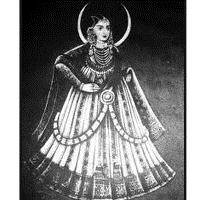Profile of Mah Laqa Chanda
Pen Name : 'Chanda'
Real Name : Chanda Bibi
Born : 07 Apr 1768 | Aurangabad, Maharashtra
Relatives : Sher Mohammad Khan Iman (Mentor)
ba-juz haq ke nahīñ hai ġhair se hargiz tavaqqo kuchh
magar duniyā ke logoñ meñ mujhe hai pyaar se matlab
ba-juz haq ke nahin hai ghair se hargiz tawaqqo kuchh
magar duniya ke logon mein mujhe hai pyar se matlab
Mah Laqa Bai was born as Chanda Bibi on 7 April 1768 in Aurangabad in the present-day Maharashtra. Her mother was Raj Kunwar, a courtesan who migrated from Rajputana, and father was Bahadur Khan, who served as a Mansabdar (military official) at Mughal Emperor Muhammad Shah's court. Khan migrated from Delhi to Hyderabad Deccan where he met and married Raj Kunwar. Chanda Bibi was adopted by Kunwar's childless sister Mehtaab Ma who was the favored courtesan of Nawab Rukn-ud-Daula, a Prime Minister of Nizam of Hyderabad. Nawab Rukn-ud-Daula took personal interest in Laqa Bai's training and provided her with the best teachers.
Mah Laqa was the contemporary of renowned poets like Mir Taqi Mir, Mirza Muhammad Rafi Sauda and Khwaja Mir Dard in North India. She was the first woman poet to author a diwan, a complete collection of Urdu ghazals. The collection, named ‘Gulzar-e-Mahlaqa’, comprises 39 ghazals, and each ghazal consists of 5 couplets. The collection was published in 1824 after her death. The ‘Diwan-e-Chanda’ is a manuscript collection of Mah Laqa's 125 Ghazals, compiled and calligraphed by her in 1798. It was signed and gifted to Captain Malcolm on 18 October 1799, during a dance performance at Mir Alam's residence. It is now preserved in the British Museum.

